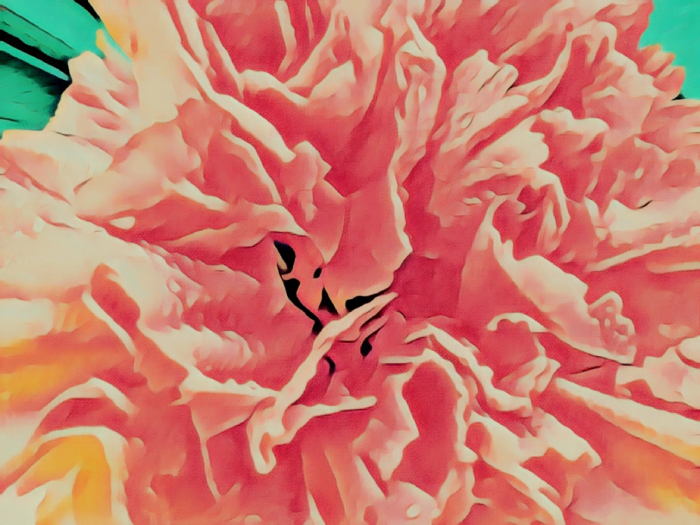Flash Nonfiction
by Elodie A. Roy

On International Women’s Day in Warsaw there are flower carts everywhere. Some sellers don’t even have a cart or a table to display their wares. They sell flowers from rickety baskets or directly from the boot of a car. Without permission. The male peddlers stand in the cold all day so that other men can buy their wives and girlfriends bunches of illicit tulips and roses. They practice the art of giving with unctuous, calculated grace.
Today, I — a stranger in the city — was given gifts by strangers. Outside the ghostly Palace of Culture and Science somebody handed me a caramel waffle wrapped in plastic. Somebody else pressed in my palm a small tube of herbal lip-gloss. I immediately threw the lip-gloss away yet hours later, back at the Moon hostel, I realised that I was hungry and took the slightly crushed waffle out of my bag. It melted in my mouth like faintly sugared cardboard — it was almost tasteless. More like a non-taste. My hunger remained.
Nearly all the women and girls I see during the day carry flowers. There are floral patterns too on the flimsy dresses they wear — too thin for the season. At Warszawa Central, men in suits are queuing outside the flower shop, patiently awaiting their turn to be served. For a brief moment, the long queue conjures up drab memories of the Soviet Bloc — visions of people (mainly women and young girls) standing for hours outside half-empty shops. Except that today the stock of flowers seems inexhaustible. Every man will get all the flowers he wants — providing he can pay. Money will buy everything.
In the station’s main hall, I observe a weathered-looking man in his mid-50s. His train is delayed and his eyes keep going from the information screen to the bouquet he’s just purchased; whenever he looks at it he seems mystified and almost awed by its presence. Every now and then he impulsively takes a long, drunken sniff at the bunch of tulips, closing his eyes. He looks like someone drowning.
I have never witnessed such a mania for flowers anywhere else before. Perhaps this is the legacy of the Soviet era — a faint memory of the bunches of flowers people would exchange on the first of May and other national holidays. Flowers as solidarity.
I think of other flowers, too — visualising the proud, yellow daffodil that has become the symbol of the Warsaw Ghetto Uprising. Flowers as resistance. As insurance against forgetting.
I cannot help noting that Women’s Day in contemporary Warsaw seems like a re-creation of Valentine’s Day. It is a commercial happening as well as a distinctly normative celebration of heterosexual love. There are boys and girls kissing everywhere. And some of the girls hold enormous, heart-shaped helium balloons bearing, in English, the words “I love you.”
I notice a bruised red rose on the ground — did it fall out of a big, luxuriant bouquet? Before long, the lone rose will be completely trampled by the crowd. Crushed by hundreds of fast, unthinking feet. People walk quickly in Warsaw. They’ve yet to learn to slow down. They hurry because part of them is still afraid. The older women remember too well how it was before the Soviet Union collapsed — the continuous fear.
Today women don’t give the women they love flowers. Their eyes rarely meet in public. In the street they walk side by side, their bodies separated by centuries of repression and forced estrangement.
Even in Warsaw, a city whose mayor signed a declaration supporting the LGBT+ community, queer love has to remain hidden. I remember the young Polish woman I met in the North of England in the late 2010s — how she told me that she was part of the “queer diaspora.” I was surprised by the violence of the expression. By her weary tone. I understand it now, but at the time I smiled: I thought she was exaggerating.
On International Women’s Day in Warsaw I think of all the same-sex couples living underground in Poland or abroad — invisible nearly everywhere. And part of me feels cheated out of something, although I couldn’t say what. I want to write “history” — but I know it’s something infinitely more complex than that. Only I don’t know the right word for it yet.
Appeared in Issue Spring '25
Nationality: French
First Language(s): French
Second Language(s):
English
Das Land Steiermark

Listen to Elodie A. Roy reading "Warsaw Sweethearts: A Women’s Day Memoirs":
To listen to the full-length recording, purchase one audio recording in our Ko-fi shop, or unlock all recordings with a monthly subscription.
Supported by:


Comments on "Warsaw Sweethearts: A Women’s Day Memoirs"
Please log in to submit a comment.
Login